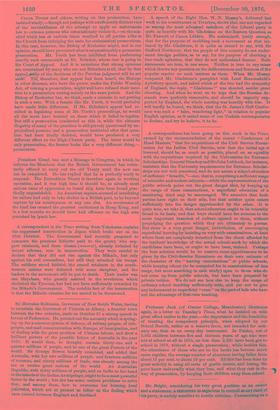Canon Trevor and others, writing on this prosecution, have insisted
wisely,—though not perhaps with a sufficiently distinct view of the inevitableness of the attempt to apply an unfortunate law to extreme persons who ostentatiously violate it,—on the mis- chief which has at various times resulted to all parties alike in the Church from indulging the taste for ecclesiastical prosecutions. In this case, however, the Bishop of Rochester might, and in our opinion, should have prevented what is unquestionably a premature prosecution. Mr. Tooth has been inhibited from performing exactly such ceremonials as Mr. Ridsdale, whose case is going to the Court of Appeal. And it is notorious that strong opinions are entertained by many who are not Ritualists at all, that by that applany of the decisions of the Parches judgment will be set asidC Till, therefore, that appeal had been heard, the Bishops in other dioceses, who have the power, under the Public Worship Act, of vetoing a prosecution, might well have refused their sanc- tion to a prosecution resting mainly on the same points. And the Bishop of Rochester has, we think, made a mistake in not putting in such a veto. With a fanatic like Mr. Tooth, it would probably have made little difference. If Mr. Ridsdale's appeal had re- sulted in legalizing some of Mr. Tooth's proceedings, he would all the more have insisted on those which it failed to legalise. But still a prosecution conducted as this is, while the ultimate illegality of many of the practices is still gravely questioned by un- prejudiced persons, and a prosecution instituted after that ques- tion had been finally decided, would have produced a very different effect on the High-Church party. The latter would be only prosecution, the former looks like a very different thing,— persecution.


































 Previous page
Previous page